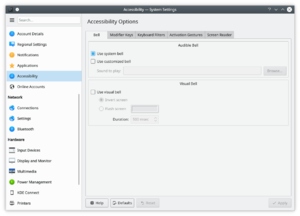System Settings/Accessibility/ca: Difference between revisions
(Updating to match new version of source page) |
No edit summary |
||
| Line 7: | Line 7: | ||
KDE conté arranjaments d'accessibilitat per a fer la vostra experiència més fàcil quan utilitzeu l'ordinador. | |||
{{Info/ca|1=Si teniu els efectes d'escriptori activats, trobareu algunes opcions que també poden ser d'interès en el mòdul [[Special:myLanguage/System Settings/Desktop Effects|Efectes d'escriptori]] de '''Arranjament del sistema'''.}} | {{Info/ca|1=Si teniu els efectes d'escriptori activats, trobareu algunes opcions que també poden ser d'interès en el mòdul [[Special:myLanguage/System Settings/Desktop Effects|Efectes d'escriptori]] de '''Arranjament del sistema'''.}} | ||
Revision as of 19:01, 26 January 2012
 |
Arranjament per a millorar l'experiència d'escriptori per a les persones amb discapacitat. |
KDE conté arranjaments d'accessibilitat per a fer la vostra experiència més fàcil quan utilitzeu l'ordinador.

A la pestanya podeu personalitzar el timbre del sistema. També podreu fer que es mostri una nota visual. Si trobeu útils aquests ajustaments, és possible que vulgueu fer una ullada al mòdul Notificacions de les aplicacions i del sistema de Arranjament del sistema.
In the tab you can customize the system bell. The visible bell settings allows you to change their preferences to having a visual notification on the screen. For example, if a document is being edited, and a sticky key is pressed, you can choose between having the document's interface window being color-inverted, or having the entire window screen of the document change to a custom user-selected color.
The slider allows you to select how long the active window will change color in milliseconds. A smaller amount of time will mean there will be a shorter pause in between visible bells, while a larger amount of time means that the visible pause will be longer.
If you find these settings useful, you may also want to have a look at the Application and System Notifications module of System Settings.
Si us resulta difícil utilitzar el teclat, les pestanyes i disposen d'opcions que poden ser-vos útils, i disposa d'opcions per utilitzar els moviments del ratolí per activar les tecles apegaloses o les tecles lentes, si no voleu utilitzar aquestes funcions tot el temps.
Modifier Keys
There are two panels here, the Sticky Keys and the Locking Keys panel. Sticky keys is a setting to make it easier to enter multiple key shortcuts. For instance, when one wants to capitalize a letter, the Shift key is pressed at the same time as the letter. Sticky Keys allow you to first press Shift, Control, or Alt, and then release it and press another key. This system will interpret it as those keys being simultaneously pressed.
There are 3 Locking Keys on most keyboards. These keys are the Caps Lock, Num Lock, and Scroll Lock keys. In the tab, you can choose to have a system bell played if these are activated or deactivated.
Keyboard filters
Slow Keys
Slow Keys allow confirmation that a key has been pressed and entered. The system bell is activated when the time allotted with the slider has passed. For a key to be accepted, it has to be held until the set amount of time. The system bell can be used to indicate when a key press has been made, accepted, rejected, or any combination of the three.
Bounce Keys
The bounce key setting is used to prevent multiple characters appearing in a document as a result of an immediate key press occurring after the first one. If you press a key again in less time that has been set with the slider, the second repeat character won't be made and a system bell might activate.
Fins i tot ajustaments simples com la desacceleració de la taxa de repetició del teclat poden ser-vos de gran ajuda.
